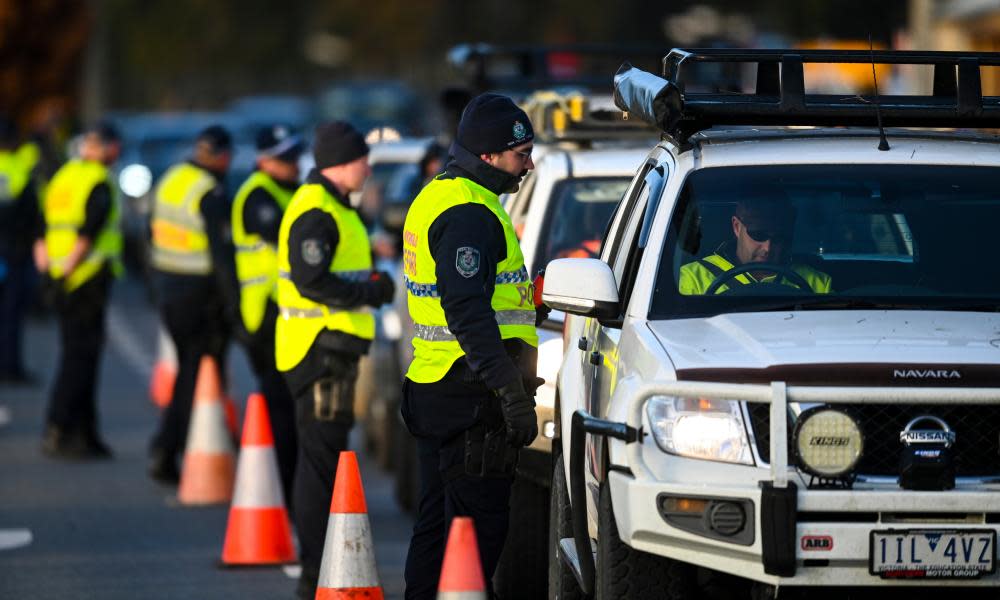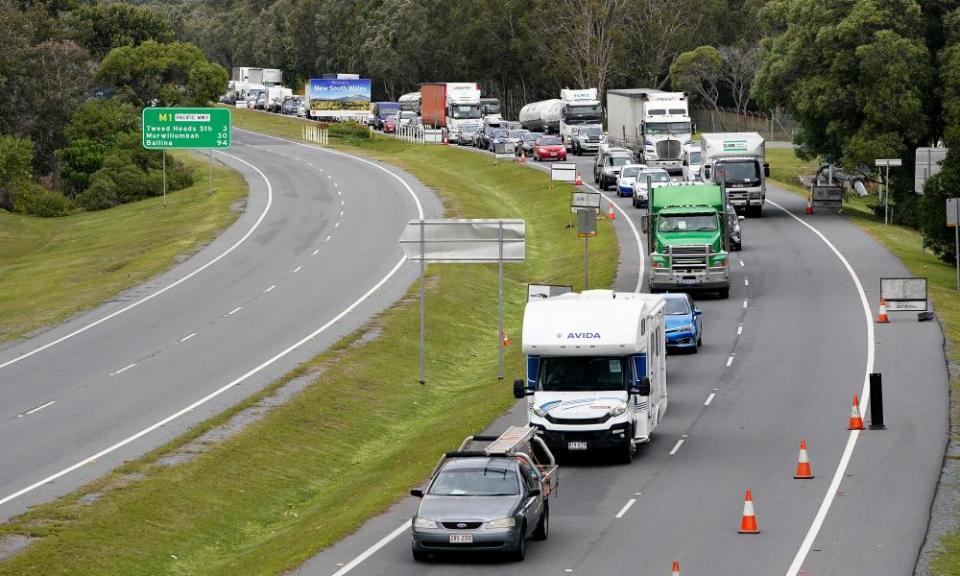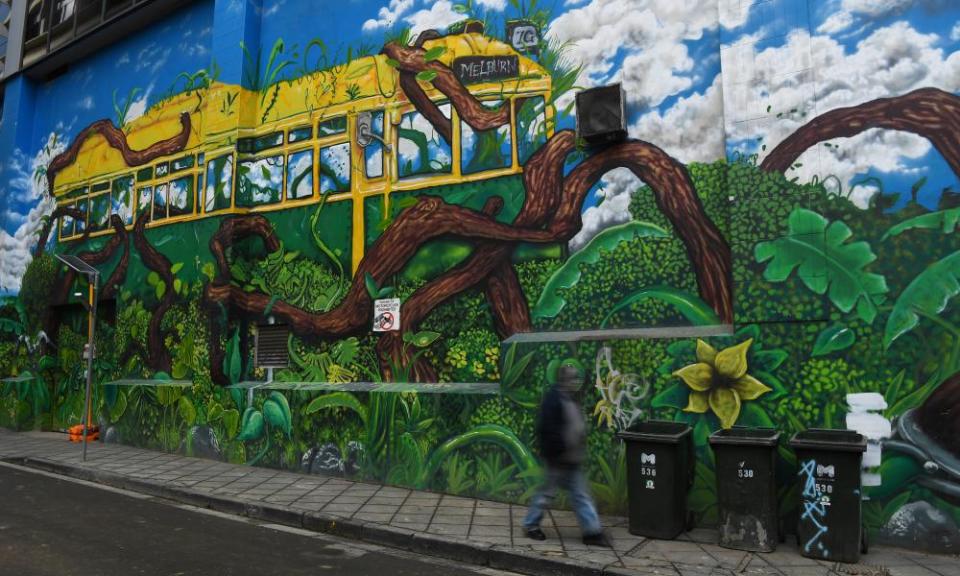'A nation divided': how Covid border restrictions have intensified Australian state rivalries

In case you hadn’t heard, Queensland premier Annastacia Palaszczuk is “putting Queenslanders first”. And if it were up to opposition leader Deb Frecklington, the sunshine state would be “FLOODED with Victorians,” Labor says.
The New South Wales premier, Gladys Berejiklian, won’t “apologise for putting safety first in NSW”. One hundred people from the ACT were stranded on the Victorian border for six days, unable to drive home due to a sudden change in permit rules. NSW insisted they go to Melbourne, then fly to Sydney and quarantine at their own expense, until sanity prevailed.
Now the Canberrans will be permitted to drive straight home, stopping only once and not for petrol.
Related: ACT residents trapped at NSW-Victoria border after overnight changes to travel restrictions
In the Northern Territory, chief minister Michael Gunner says border controls could persist for “hotspots” for another 18 months.
And don’t plan on travelling interstate for Christmas. “If you can, cancel your Christmas holiday plans and stay here in the Northern Territory.”
One nation with hard borders
Australia is a nation of just 25 million people, but the revival of state parochialism has been swift and intense. It is as though federation was a nice idea at the time, but at heart we are Queenslanders, South Australians, Tasmanians and Victorians (shame!).
Invisible borders define whether the police will fine you $200 for not wearing a face mask (Victoria), or whether you can have 100 guests at your wedding but only the couple can have a first dance (Queensland), or if the royal show will go ahead this year with a 25% discount on tickets (Western Australia).
‘A nation divided’ is journalese, but it has a whiff of truth about it. This is the year we reverted to colonies again, the veneer of friendliness – “we are all Melburnians now” – masking the revenge of the far flung, put-upon states.

You want to roll your eyes at parochial Queensland and paranoid Western Australia? On Wednesday, Queensland had zero new cases and 10 cases under investigation. Total deaths from Covid-19: six. On Tuesday, Western Australia had zero patients in hospital with the virus and no new cases. Total deaths during the pandemic: nine.
Meanwhile, Victoria has more than a month to go on stage four restrictions, hundreds of cases a day, its aged care homes a rolling tragedy. On Wednesday, it reported 21 deaths in a single day and that 267 people had died in total. NSW recorded 18 new cases on Wednesday, with the state jittery and “on high alert”, the premier said.
We are one nation with hard borders, retreating to the comfort of tribes. Other states have border restrictions – Victoria doesn’t need to because no one can go anywhere – but Queensland and Western Australia have come under the most intense criticism, with disgruntlement from Canberra a few months ago, now subdued due to the “Victorian wave”, as Scott Morrison calls it.
Western Australia shut its border to all states and territories for all but essential travel on 5 April, and that might persist for “months and months and months”, says premier Mark McGowan.
Related: 'Queensland first': Palaszczuk closes the borders and amps up election rhetoric
Only Queensland renegade businessman Clive Palmer, furious at being denied entry, is challenging the border closures in the high court, arguing they are unconstitutional. The health risk from states such as Queensland, South Australia and Tasmania is negligible, but McGowan’s nod to the state’s secessionist streak is “staggeringly popular”, as one local journalist put it. The state election is next March.
Queensland has an election on 31 October, and the contest with the Liberal National party appears surprisingly tight, according to opinion polls, even though 81% of Queenslanders support Palaszczuk’s handling of the pandemic.
Palaszczuk swatted away NSW pressure in May for Queensland to open its border, saying she was “not going to be lectured to” by a state with the then highest number of coronavirus cases. It opened in July (although not for the hapless Victorians), then hardened again against “hotspots” this month, including almost all of NSW and the ACT.
We’re all in this together, like it or not
Perhaps this makes some kind of sense. The national cabinet process gave the state and territory leaders recognition and stature for their roles in running hospitals, schools and police. They are responsible for contact tracing and rules around staying at home.
Morrison has looked on askance at times, but the more local the state focus, the more popular the leaders appear to be. Even glum Victorians have a defiant pride, repeating to themselves that “we can do this” despite the swiping from across the borders.

Victorians do look on with envy, or at least longing. In June, premier Daniel Andrews scoffed at South Australia’s decision to loosen its borders except for Victorians: “Look I don’t want to be offensive to South Australians, but why would you want to go there?” he said. What a humiliation it seems now, with police and defence personnel preventing Victorians trying to sneak in.
Queensland is hosting 10 Victorian AFL teams and wants to host the grand final, which every Victorian knows belongs at the MCG. The Queensland AFL hub “will be worth millions to the Queensland economy,” says Palaszczuk, with her characteristic smile. Queensland sports stadiums can operate with 50% of crowd capacity.
Related: Australia's Covid-19 border restrictions: where you can travel to and from
Victorians can’t play sport, let alone have fans watching. What’s next? The states squabbling over the Australian Open tennis, the Melbourne Cup?
State rivalries are not new and can be entertaining. But “we are all in this together” seems a distant memory. Victoria’s economic malaise is likely to drag Australia’s economy down, too, whether you’re a Queenslander, from NSW, a Tasmanian, a South Australian, a Western Australian or a Territorian. Like it or not, we really are kind of all in this together. Yet the state bubbles seem so comforting now, and the borders at least something we can control.

 Yahoo News
Yahoo News 
